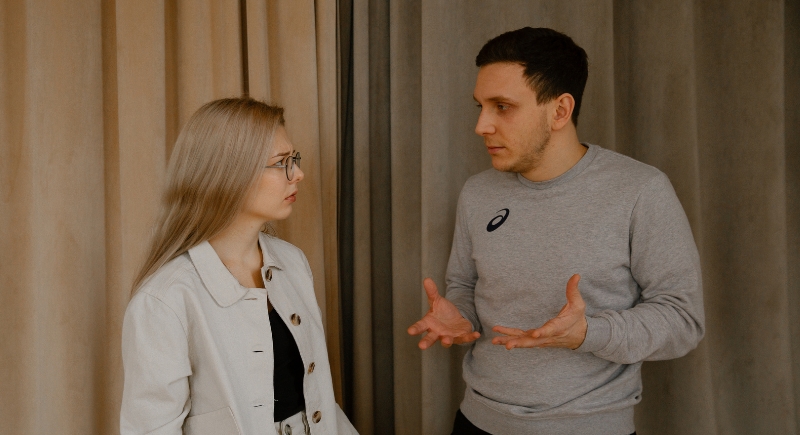Healthy Couples Speak Differently—Do You Use These Phrases?
Big, dramatic gestures get all the attention, but most relationships grow strong in the day‑to‑day. What people choose to say—or not say—has a way of shaping how connected they feel. Therapists and researchers keep finding the same thing: couples who thrive sound different. Here’s a look at some of those phrases in action.
I Get Where You’re Coming From

Credit: Getty Images
Tension often eases the moment someone feels understood. A quick “I get where you’re coming from” shows you’re not brushing off their opinion. Lynn Zakeri, a licensed clinical social worker, points out that validating each other—even mid‑disagreement—lowers defenses. It’s showing that both perspectives have a place at the table.
Did I Get That Right?

Credit: Canva
Nothing derails a conversation faster than assumptions. Healthy couples stop to check themselves with a simple, “Did I get that right?” This small habit proves you care enough to confirm. It also allows the other person to clarify, which keeps little miscommunications from snowballing.
How Can I Support You?

Credit: Canva
When one person is overwhelmed or juggling too much, this question opens the door for help. Therapist Kayla Crane notes that offering support directly reinforces the idea that neither person has to go it alone. Sometimes, the answer is as simple as being present.
Does That Work For You?

Credit: Getty Images
Healthy couples aren’t mind readers and don’t expect their partners to be, either. Saying “Does that work for you?” keeps decisions from feeling one-sided. It might be about a big move or just weekend plans, but the message is the same: you matter in this choice.
I Need X, Can You Y?

Credit: Getty Images
Clear requests keep relationships free of guesswork. Instead of hinting, partners who speak plainly—“I need some quiet time, can you handle the kids tonight?”—build mutual understanding.
I’m Sorry

Credit: Getty Images
Dr. Julie Schwartz Gottman has seen countless couples rebuild trust by simply saying “I’m sorry” and meaning it. A genuine apology shows that peace matters more than pride. It’s a moment of accountability, and those moments build a relationship where both people feel safe owning their mistakes.
Let’s Spend Some Time Together

Credit: Getty Images
Healthy couples don’t rely on autopilot. They make space to connect intentionally, whether planning a dinner or walking the dog together. Relationship studies repeatedly link shared activities with higher satisfaction. A casual invitation reminds both partners that bonding isn’t just for special occasions, but part of everyday life.
I’m Proud Of You

Credit: Getty Images
Saying “I’m proud of you” after a promotion, a personal goal, or even a tough week signals appreciation. According to family therapists, regular acknowledgment of achievements nurtures self‑esteem and closeness. It shifts focus from stress to gratitude, an often‑overlooked ingredient in long‑lasting relationships.
We’ll Get Through This

Credit: Getty Images
Challenges are inevitable, but language shapes how couples face them. Phrases like “We’ll get through this” show confidence in the partnership. Such statements create emotional safety and let both people know they’re not facing difficulties alone.
Go Out And Have Fun With Your Friends

Credit: pexels
Trust thrives when partners respect each other’s independence. Encouraging a night out or a hobby says, “I’m secure with you.” Research shows couples who support individual interests often feel closer, not farther apart. A lighthearted note demonstrates faith in the relationship while celebrating each other’s personal space.
I Trust You

Credit: Getty Images
Few phrases carry as much weight as this one. Trust forms the backbone of emotional security, and hearing it directly reinforces stability. Instead of assuming trust is understood, healthy couples spell it out with words like “I trust you,” making reassurance part of everyday dialogue.
Can We Talk?

Credit: pexels
Healthy communication means addressing issues early. A calm “Can we talk?” signals that something matters enough to discuss, without creating alarm. Therapists note that couples who feel safe raising concerns often resolve problems before they grow. This phrase sets the stage for openness and signals that the goal is understanding.
I Feel…

Credit: pexels
Expressing emotions clearly is a skill that prevents blame. Saying “I feel unheard” or “I feel nervous about this” shifts focus to personal experience rather than accusation. Dr. John Gottman’s research shows that “I feel” statements reduce defensiveness and invite constructive conversation.
May I Take That Back?

Credit: Getty Images
In the heat of an argument, people sometimes say things they regret. Successful couples often repair quickly with phrases like “May I take that back?” or “Let me try again.” These quick resets signal humility and a desire to return to respectful dialogue.
I Appreciate…

Credit: pexels
Acknowledging a partner’s efforts keeps relationships thriving. Saying “I appreciate you cooking tonight” or “I appreciate how you handled that call” builds goodwill. Studies on gratitude in relationships show that regularly expressing appreciation predicts higher happiness levels.